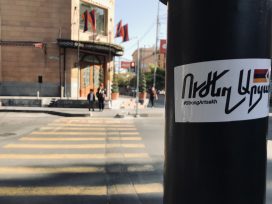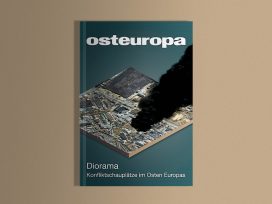Abstracts Osteuropa 1/2007
Lev Gudkov
Russia’s systemic crisis. Negative mobilization and collective cynicism
Since Vladimir Putin came to power, Russia seems stronger than it has been for a long time. But appearances are deceiving. Russia is degenerating into a corrupt police state, society is sinking into poverty, and the country is heading towards isolation. The system of government’s crisis of legitimacy is shown by a targeted negative mobilization which foments hatred of “the oligarchs”, the United States and NATO, and Georgia and Ukraine. Fear of the future, cynicism, imagined enemies, and diffuse aggression are spreading. The need for a protective collective is growing. Anyone who identifies an enemy and demands his annihilation becomes a conveyor of meaning. Nonetheless, the political determination on display conceals only omnipresent state incompetence.
Regine Richter, Kai Schäfer
Money for oil. German banks in Russian oil production
In Russia, almost $20 billion must be invested over the next 10 years in the production, processing, and transport of oil. A significant part of the necessary capital must be obtained from international capital markets. German banks have already taken on a leading role in allocating consortium credit. In the process, environmental and social standards have thus far hardly played a role in informing the banks’ decisions – even though the oil industry is among the greatest polluters of Russia’s environment.
Björn Kunter
Belarus: Do no harm. Requirements for the external promotion of democracy
Foreign promoters of democracy have encouraged the establishment of a pseudo-opposition in Belarus. This is oriented not towards the population’s needs, but towards the financial donors’ ideas. A lack of analysis of the effects of this activity, hierarchical mechanisms of decision-making, and the orientation towards pseudo-successes have estranged the opposition from the population. This is one cause for the failure of the country’s democratic awakening. In order to achieve lasting effects, the promotion of democracy from abroad requires a more modest, cautious, and self-reflective style. In addition, the lessons of non-violent action should be considered more frequently.
Ingo Petz
Awakening through music. The cultural anti-elite in Belarus
For the democratization process in Belarus, there is a partner who has received too little notice so far. Since the middle of the 1990s, a cultural opposition made up of young people has taken shape. Their creativity and activities are an important force for democratic change. The protests after the presidential election in March 2006 showed this. The promotion of democracy from the West ought not only look at the opposition parties. It is necessary to consider this new informal opposition and to offer it a forum in Europe. It is here that a young anti-elite is taking shape which will form tomorrow’s Belarus.
Thomas Urban
Cover model Hitler. Germany’s image in the Polish media
Leading Polish newspapers and magazines talk of a return of German striving for great power status. Hitler is celebrating a comeback as a means of interpreting all contemporary events in Germany. Particularly frequent are distortions, forgeries, and omissions in reporting about the project for a Berlin-based centre for documenting the expulsion of Germans from central Europe after the war. Two phenomena are coming together here. First, a liberal press law allows journalists to construe background or telephone conversations as interviews. The hurdles for publishing an opposing point of view are set high. Civil suits often drag on for years. Second, German-Polish debates over the past are at different stages. In Poland, it is a matter of passing on the image of Poles as German victims. In the Federal Republic, debates are held over the proper way to remember National Socialism.
Pavel Pecínka
Emancipation or folklore? The European Roma organization
For decades, Roma from various European countries have been trying to build up European Roma organizations. The most important are the International Roma Union and the Roma National Congress. This idea has received new impetus since the Council of Europe in 2004 established an umbrella organization called the European Roma and Traveller Forum. However, all Roma organizations operating at the international level are struggling with the problem of internal schisms as well as with the only partly justified criticism that they have become estranged from the people they are supposed to represent.
Per Brodersen
Broken identities. The Kaliningrad region in the post-war era
After East Prussia was captured, the northern half of Germany’s easternmost province fell to the Soviet Union and was given the name Kaliningradskaya oblast’. But the history of the region did not simply come to a halt. Not only do physical remnants of Königsberg still exist. The old was still present in the new in everyday life as well. The population exchange, the geographical position, and the problems of everyday life hampered the Soviet regime in Moscow and provincial officials in creating new identities among the region’s inhabitants. The Kaliningrad and Soviet identities remain broken.
Diana Zitzmann
The Russian banya under communism. Aleksandr Nikol’skii’s Leningrad baths
Between 1927 and 1930, the constructivist architect Aleksandr Nikol’skii built two public bath complexes in Leningrad. Although the Bol’sheviki wanted to break with the pre-revolutionary past, the communal economic office decided to build ur-Russian banyas. Compared with their predecessors, however, the buildings showed clear differences in function and shape. The minimalist allocation of space and the sober atmosphere express Soviet cultural ideals. These banyas thus represent a rejection of traditional leisure culture and banya mysticism.
Karlheinz Kasper
Russia’s “new realists”. Sergei Shargunov, Roman Senkhin, and comrades
The literature scene in Russia used the turn of the millennium as an occasion to take stock of Russian literature’s development in the post-Soviet era and to look for signs of a paradigm change. The already present criticism of post-modernism, which dominated the literary landscape after the collapse of communism, has since grown. The “new realists” – among whom the writers and publicists Sergei Shargunov and Roman Senkhin enjoy a special position – have come to play an important role in the anti-post-modern, partly nationalist imbued discourse.
Kai Struve
Rooms of memory, narratives of history. New Books on Ukraine during the Second World War
Cultures of memory and historiographies are closely related. Recent books on the history of Ukraine during the Second World War also confirm this. While research on the present-day Ukrainian culture of memory reveals the hegemony of a heroic, national historical narrative which largely excludes the memory of the Holocaust, the fate of the Jews has stood at the centre of Western research at least since the 1980s – a development which reflected a change in Western collective memories taking place at that time. New research, however, shows an effort to write an integrated history of the German occupation regime in which the Holocaust is set within overall policy and the fate of the various population groups, including their own experiences and points of view, is taken into consideration.
Published 17 January 2007
Original in German
Contributed by Osteuropa © Osteuropa
PDF/PRINTNewsletter
Subscribe to know what’s worth thinking about.



